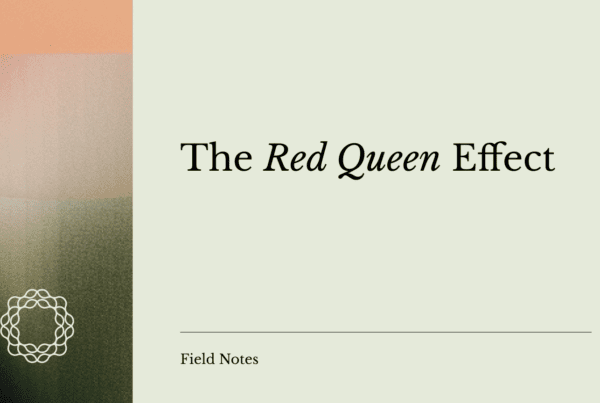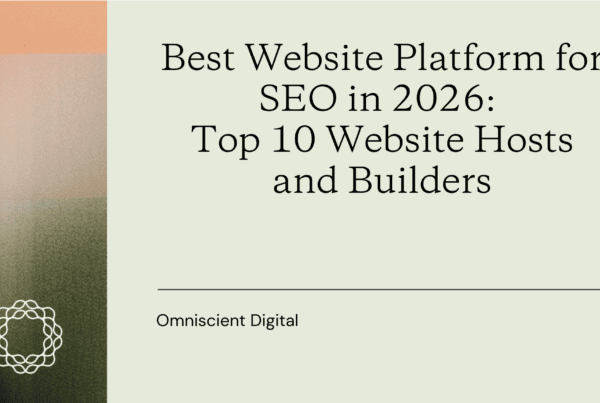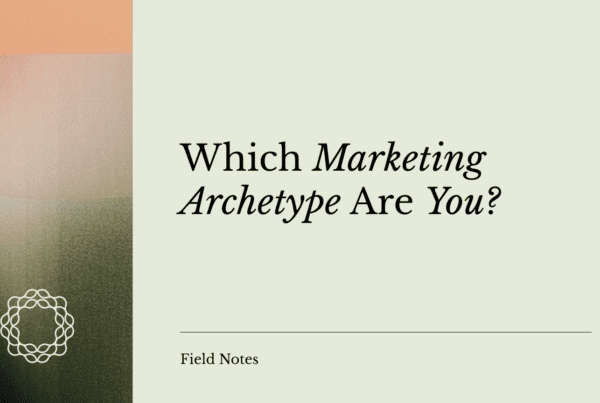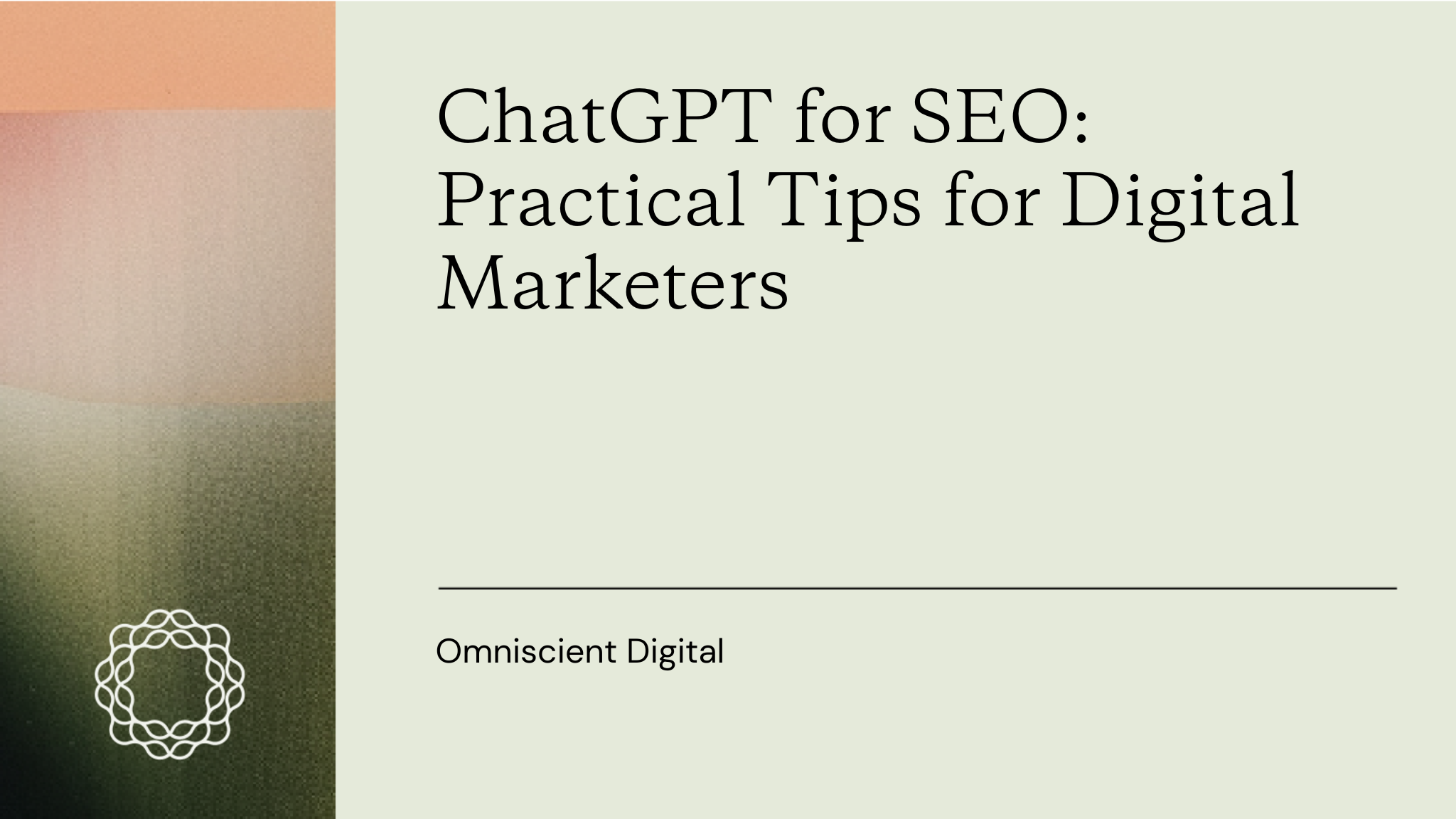
Did you know that 72% of SEO professionals aren’t using AI? In a world where AI-generated content makes up over 13% of Google’s top-performing results, if you’re not utilizing it, you’re leaving opportunities on the table!
Tools like ChatGPT can simplify and boost your SEO game. I’m talking about faster keyword research, better content ideas, and effortless content creation.
When used correctly, ChatGPT is your SEO co-pilot, always ready to brainstorm, analyze, and optimize while saving you hours of work.
So, where’s the trick? Can you really entrust complex campaigns in the hands of generative technology?
You can, but you shouldn’t. ChatGPT, on its own or in the wrong hands, is up to no good. This is a smart tool that needs expert insight and supervision to deliver high-quality results. When used correctly and with the right intention, the results will blow you away.
But enough hype! Let’s see how to design your SEO for ChatGPT and avoid pitfalls that many fall for.
Understanding ChatGPT’s impact on SEO
What is ChatGPT?
In simple terms, ChatGPT is an AI language model designed to understand and generate human-like text based on the input you provide. Open AI developed and owns the technology.
Built on advanced machine learning, it uses natural language processing (NLP) to analyze your prompts (instructions), predict what comes next, and deliver relevant and coherent and realistic responses that feel more natural to users. This is where the GPT comes from: generative pre-trained transformer models.
You could say that this AI tool learned pretty much as you and I do but at a whole different level. The model was trained on a ton of stuff—books, websites, articles—you name it. That’s how it got so good at predicting what words come next in a sentence.
So, if you ask it to write the outline for a blog post about pizza, it’ll know to mention toppings like cheese, pepperoni, and maybe even pineapple (if you’re into that).
ChatGPT for SEO: How does it work?
Now, let’s focus on the part that matters for today’s topic: search engine optimization in the age of AI.
What can generative artificial intelligence do for you, the marketer?
Here are a few SEO tasks that become easier when ChatGPT enters the scene:
- Keyword research
- Brainstorm ideas for content creation
- Write meta descriptions, tags, and snippets
- Write copy for social media
- Generate schema markup
- Content optimization
- Help in crafting outreach emails
And the list can go on and on and on.
From brainstorming to publishing, ChatGPT streamlines the process, saving you time and boosting your SEO results. The secret is to provide clear instructions and refine the output using prompt engineering techniques until you get the quality you want.
Is ChatGPT the only option?
As you probably know, Open AI is not the only company in the artificial intelligence market. There are a myriad of AI-powered tools out there, especially in the SEO sphere.
If I were to think about ChatGPT’s contenders, Jasper AI, Surfer SEO, and Clearscope are the first ones that come to mind. They all have better built-in SEO features than ChatGPT, but they are less creative and flexible.
Plus, ChatGPT is the only one with a pretty accessible free version.
Overall, each tool has its strengths, depending on whether you need creative flexibility, SEO power, or content optimization.
Here’s a breakdown of their features so you get a better idea of what you’re dealing with:
| Criteria | ChatGPT | Jasper AI | Surfer SEO | Clearscope |
| Ease of Use | Simple, conversational interface | Intuitive, tailored for marketing | SEO-focused but with a learning curve | Streamlined for content optimization |
| Content Quality | High-quality, flexible output | SEO-optimized, marketing-focused | Strong for technical SEO content | Focused on keyword-rich content |
| SEO Features | Limited built-in SEO tools | Some SEO integration | Comprehensive SEO tools (keywords, SERP analysis) | Strong content scoring and optimization |
| Customization | Highly adaptable to tone/style | Excellent tone/style presets | Less adaptable for creative writing | Moderate tone/style flexibility |
| Integration | No direct platform integrations | Integrates with some platforms | Strong integrations (WordPress, etc.) | Works well with CMS and SEO tools |
At the end of the day, whether you choose Jasper AI or Open AI’s creation, one thing is clear: the only way to stay competitive from an SEO point of view is with the help of generative AI tools.
As Morgan Taylor, co-founder of Jolly SEO, put it, “These tools streamline time-consuming tasks like content creation, keyword research, and SEO optimization, allowing you to focus more on marketing strategy.”
How ChatGPT helps with keyword research and content creation
Keywords and content are some of the most energy and time-consuming tasks in SEO. So, here are a few tips to help you speed things up without losing quality:
Important info: ChatGPT doesn’t have access to keyword search volumes. So, you still have to use proper keyword research tools and do the work. Once you get an idea of your target keywords, you can use the tool to get other relevant keywords and expand your reach.
Long-tail keywords and search queries
Ask ChatGPT to generate long-tail keywords and search queries by asking it to expand on specific topics or target phrases.
Let’s say your keyword research shows that your marketing campaign should gravitate around the term healthy snacks. Based on this finding, ask ChatGPT to suggest related long-tail keywords.
- Prompt example: What are some long-tail keywords for ‘healthy snacks’?
- Output: healthy snacks for weight loss, easy healthy snacks for kids, low-calorie office snacks.
To grasp search intent, ask ChatGPT to generate common search queries users might type into Google.
- Prompt example: What are common search queries about healthy snacks?
- Output: “What are the healthiest snacks for dieting?” and “How to make quick healthy snacks at home?”
Ask ChatGPT to help with content creation
Brooke Webber, the head of marketing at Ninja Patches, once said, “Creating relevant content starts with understanding search intent. When you align your strategy with what users are looking for, you deliver value and drive engagement.”
In our case, if a user wants to know how to make healthy snacks at home, you write a recipe blog post. If they look for the healthiest snacks for dieting, you recommend low-calorie and sugar-free products.
Everything starts with generating content outlines, and ChatGPT apps are very useful for this type of task.
- Prompt example: Create an outline for an article that recommends the top 10 healthy snacks that are low in calories.

Screenshot provided by the author
To push things further, you can even ask the language model to expand on specific sections of the outline.
For instance, you can ask it to write a draft for the first section (Why Choose Low-Calorie Snacks). The output will be a detailed explanation of why low-calorie snacks are good for your health.
From there, you can continue to ask ChatGPT to rewrite or optimize sections for SEO, tone, or clarity.
Automate repetitive tasks
Search engine optimization has a lot of repetitive tasks that don’t necessarily require creative energy. Things like:
- Title tags and meta descriptions
- Content optimization for SEO
- Schema markup generation
- URL optimization
- Data analysis
- SEO performance reports
- Improve your internal linking strategy
All these and more are important SEO tasks that eat away your time and brain energy. If you’re ready to upgrade to the next level, ChatGPT is the answer.
Here’s a prompt you can use: Create 3 SEO-friendly titles and meta descriptions for a blog post about “low-calorie snacks.”
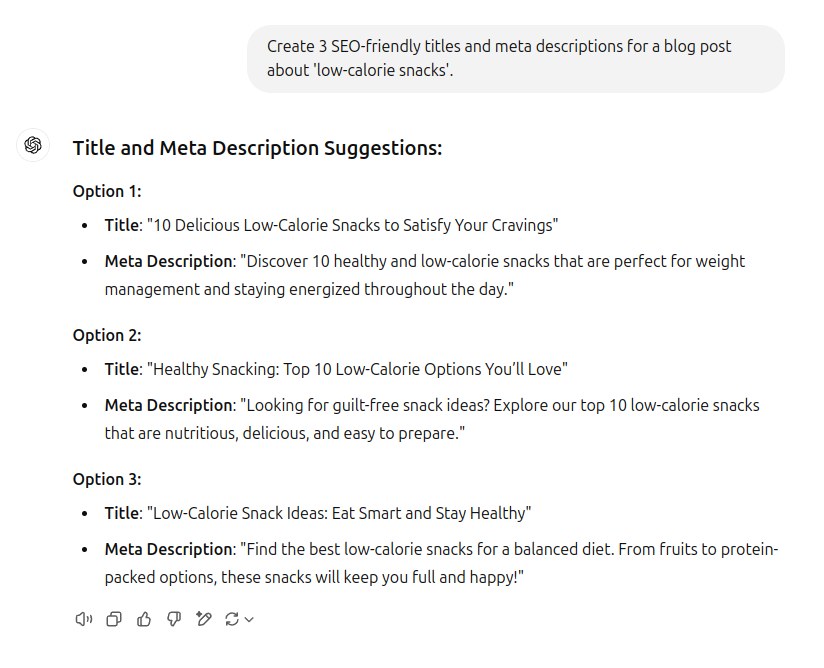
Screenshot provided by the author
ChatGPT can also help with product descriptions. If you have an online store, you know how annoying this can be.
Max Tang, CMO at GEEKOM, said, “Integrating ChatGPT to automate product descriptions was a game-changer. It saved us countless hours, improved consistency, and allowed our team to focus on strategy and growth.”
Here are a few more prompts that can be of help:
- To generate schema markup: Create schema markup for a recipe webpage with the title “Avocado Toast,” cooking time 10 minutes, and 300 calories.
- For URL optimization: Suggest SEO-friendly URLs for pages or blog posts.
Outreach for link-building: Craft an outreach email, using a professional writing style, to request a backlink for an article about sustainable packaging.
Let’s be clear here: I’m not suggesting you use ChatGPT to do all the work. Digital marketing is a complex process that needs both creativity and elbow grease. But AI can help you cut some corners without losing quality.
To get the best results, provide clear instructions with context and examples, and always review the output to ensure accuracy and alignment with your strategy.
Implementing ChatGPT for technical SEO improvements
Factors like content structure, readability issues, page loading speed, crawlability, indexing, and others are just as important as your content strategy. They impact how search engines see your site and where your pages show in SERP.
I know Google Search Console is a great tool to identify technical issues and fix them, but you can also use ChatGPT to get a broader view. Here’s how:
Optimize content structure and readability
ChatGPT can analyze content to suggest improvements in structure, such as clearer headings, better flow, and concise paragraphs.
You can use ChatGPT to optimize content structure by asking it to analyze or rewrite your content for clarity, readability, and SEO. Here’s how:
Ask ChatGPT to suggest logical headings that break down your content into easy-to-read sections.
- Prompt example: Rewrite this article with clear headings and subheadings about healthy eating tips.
Ask it to identify and fix overly long or complex sentences for better readability.
- Prompt example: Simplify this paragraph: “The importance of maintaining a balanced diet cannot be overstated as it plays a crucial role in overall health, including physical, mental, and emotional well-being.”
Ask it to rearrange sections in a text to create a natural progression of ideas.
- Prompt example: Organize this content about “How to Make Healthy Snacks at Home” into logical steps.
Ask ChatGPT to help with on-page local SEO improvements.
- Prompt example: Review my website content and suggest on-page local SEO improvements. Focus on optimizing for [city/region name], including adding location-specific keywords, improving meta descriptions, and incorporating local business schema.
Jonathan Feniak, General Counsel at LLC Attorney, talks about how much ChatGPT helped boost their firm’s visibility once the digital marketing team understood its power. He said, “ChatGPT transformed our firm’s visibility in each of the states we cover. We saw a significant boost in engagement and reach over a short period of time.“
ChatGPT for site audit recommendations
I do not recommend using ChatGPT as a fully trusted audit tool, but if you ask it to analyze specific areas of your website for SEO improvements, it can provide insightful recommendations.
For instance, you can ask it to identify duplicate content, missing meta tags, or areas needing keyword optimization. You can also get suggestions on how to improve your internal linking structure for better navigation and SEO.
Everyone knows that one of the best ways to boost your SEO efforts is to ensure a top-notch user experience (UX). The fusion of user experience (UX) and search optimization creates a powerful combination that attracts visitors and delivers an engaging, satisfying website journey. However, this can be difficult to assess without external help. So, why not ask ChatGPT?
A simple prompt like “Suggest ways to improve the user experience on this homepage” can suggest things you might have missed, such as improving mobile responsiveness or simplifying navigation.
Be aware of ChatGPT’s limitations
“AI tools like ChatGPT are powerful, but without proper guidance, they can veer your digital marketing strategy off course. Human oversight ensures your messaging stays aligned with your target audience and business goals.” — Peter Čuček, the owner at Tuuli.
ChatGPT is a powerful tool, but it has clear limitations you have to be aware of, especially when it comes to technical SEO.
Here are some of them:
- It cannot crawl or analyze live websites. The tool relies on the information you provide and cannot access tools like Google Search Console for more in-depth data.
- It’s not equipped to handle advanced SEO tasks, such as JavaScript rendering issues or server log analysis. You still need specialized SEO tools.
- It doesn’t have access to your analytics platforms to provide insights on site performance, traffic trends, or ranking changes.
- ChatGPT’s knowledge isn’t updated in real-time, so it may not reflect the latest algorithm changes or SEO practices unless specifically informed by your input.
Its limitations also extend to content creation and content marketing. ChatGPT is excellent for generating ideas and crafting content, but you have to refine the output and give it a human touch.
Preparing for the future: AI’s role in SEO
When asked about their hopes for what AI will mean in the future for SEO, Murtaza Oklu, the owner of OMO Transfer, said: “I’m hoping for genuinely smarter tools that truly understand and anticipate customer needs, making AI digital marketing more personalized and impactful.”
For now, we know for sure that the algorithm behind generative AI is getting smarter. What’s more likely that we’ll see next is the integration into search engines for real-time optimization and insights.
Future updates may enable AI to predict search trends or provide deeper analytics by connecting directly with SEO platforms.
The best way to stay ahead is to embrace AI tools while keeping an eye out for authenticity. AI-generated content is very attractive, but you have to remember this content is for human readers.
No one wants to read soulless texts crowded with keywords that don’t deliver any value.
Right now, the AI + human approach is the best content marketing and SEO strategy. Combine AI-driven keyword research with unique human-driven storytelling to create compelling and high-ranking content. Also, take all AI recommendations with a grain of salt and make your decisions based on reality.
Conclusion
ChatGPT and other AI-powered tools are here to stay. So, the only way forward is to accept it and find ways to integrate smart tools into your workflow.
The good news is that it’s not all so bad. SEO and content marketing with ChatGPT is simpler, less time-consuming, and easier to handle (especially for the small guys).
However, success lies in balancing AI with human oversight and ethical practices. Our team at Omniscient Digital offers expert guidance and resources that help you craft authentic, data-driven strategies that align with your goals.
Want to supercharge your SEO strategy? Let’s talk! Contact us today to explore how we can elevate your digital marketing efforts. Reach out to Omniscient Digital now.

